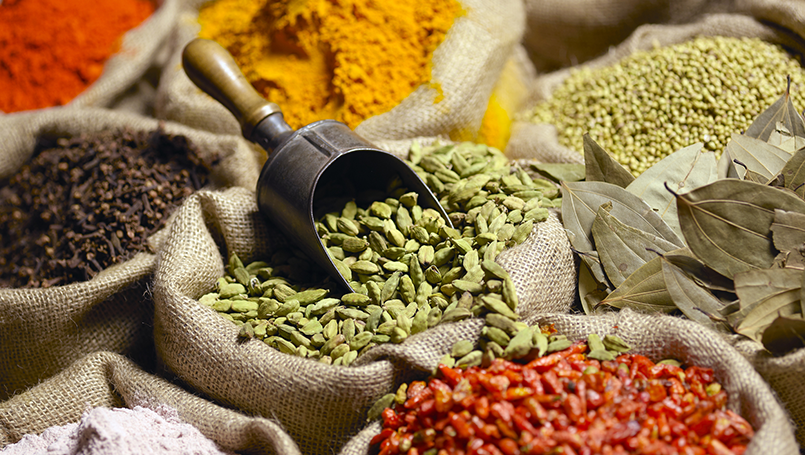Monday, November 13, 2023

Want to add a nutritional boost to your meals? Look to your spice cabinet.
Spices and herbs offer a flavor boost and pack a punch when it comes to antioxidant and phytonutrient power.
Why do we need antioxidants and phytonutrients? They help fight cancer and disease, as well as reducing inflammation and cell damage.
And because the typical American diet is nutrient-deficient, we can all use an extra boost.
Here are some spicy stars:
Turmeric
Turmeric root contains a compound called curcumin that helps fight cancer, inflammation and cell damage. It is often used in curries and provides a yellow color to dishes.
Ongoing research suggests curcumin may be beneficial in preventing colon cancer and Type 2 diabetes, as well as preventing Alzheimer’s disease and other inflammatory conditions like arthritis, colitis and dermatitis.
On its own, curcumin is not absorbed well. A compound called piperine, found in black pepper, can help the body absorb it better. So be sure to use them together.
Ginger
Some people will traditionally treat pain and nausea with ginger, which is also a root. It contains gingerols, a relative of capsaicin found in peppers. This gives ginger its spicy, pungent flavor.
This compound can also aid in digestion and fighting colon cancer, and it acts as an anti-inflammatory. Use it in smoothies, oats, baking, teas or Asian cooking.
Garlic
A common ingredient to most savory dishes, garlic adds beneficial organosulfur compounds. To activate them, chop the fresh garlic and let it sit for 10 minutes before adding it to cooking—the heat stops the reaction.
These organosulfur compounds can help improve cholesterol and blood pressure, as well as helping fight inflammation, cancers and bacteria. Garlic also contains beneficial prebiotics to help feed the gut flora.
Use with caution if you have GERD or irritable bowel syndrome, as it may trigger symptoms. Larger doses can have a blood-thinning effect.
Cinnamon
Popular in fall sweets, cinnamon adds a warm flavor to dishes.
It provides the beneficial compounds cinnamaldehyde and eugenol, which help reduce blood sugar in patients with diabetes. These anti-inflammatories may also help protect against Alzheimer’s and Parkinson’s disease, as well as fighting bacteria that can cause bad breath. They may also aid in fighting urinary infections and multiple cancers.
Add cinnamon to smoothies, oats, baked goods, teas and Asian or Middle Eastern dishes. When using in large doses—more than 1 teaspoon per day—look for Ceylon cinnamon instead of the common Cassia cinnamon. Ceylon cinnamon has less coumarin, which can be toxic to the liver in large doses.
Cloves
One of the highest-antioxidant spices, cloves add a health-boosting punch to a dish. An ancient spice of the Orient, cloves are a dried flower bud with a strong aroma and a flavor commonly used in ketchup and Worcestershire sauce.
Historically, it was used as a numbing agent. It contains beneficial compounds that aid in digestion, help relieve dental pain and fight bacteria and inflammation. Cloves pair nicely with cinnamon or ginger in dishes.
Cumin
Cumin seeds have been around since ancient times in many cultures. Cumin is commonly used to flavor curries, veggies and bean dishes.
Cumin has been used medicinally for digestive issues by stimulating bile production to digest fats. It may also fight inflammation and help provide protection from stomach cancer.
Alternatively, you can try black cumin for added protection from cancers, or as an immune system boost. It may also help protect against ulcers and aid in weight loss.
Oregano
Common in Mediterranean cooking, oregano has a peppery flavor with a sweet aroma. Full of antioxidants like carvacrol, oregano can help fight cancer, bacteria, viruses and fungal infections. Sprinkle liberally on Italian dishes and tomato sauces.
Rosemary
This aromatic herb, which has a distinct woodsy flavor, is also used in Mediterranean cooking. Because of its high antioxidant activity, rosemary serves as a natural preservative in foods.
You can also use it in marinades to protect against dangerous compounds formed when grilling meat. Rosemary may also help protect the liver, prevent Alzheimer’s, aid in digestion and fight bacteria and fungal infections. Use it in marinades, soups, salads and stews.
With the holiday cooking season upon us, it’s a great time to start experimenting with these spices and herbs. Be intentional about adding these ingredients to your dishes.
